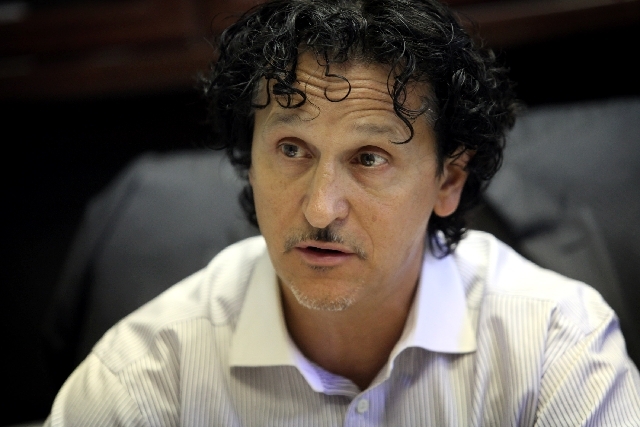Salmonella creates complications, hard choices for pregnant Las Vegan
Positive. Everything, Konstantino Kouris remembered, was so positive about his ladylove’s pregnancy for almost nine months. His “Myla,” Lyudmyla Radchenko, loved being pregnant. She talked and talked to their baby inside her swollen belly.
But then in late April, a couple of days after they walked over from their All Real Estate investment company office to have lunch with their friend Nikk Zorbas at the Firefly restaurant next door, Myla got sick. A throwing up, high temperature, diarrhea kind of sick.
Though doctors first saw the symptoms as a commonplace indication of pregnancy, stool samples taken after her condition worsened showed –– and continue to show –– she suffers from salmonella, food poisoning that caused the Southern Nevada Health District to shutter the Paradise Road Firefly on April 26.
To their horror, the couple learned that what was generally causing others a few days of distress –– nearly 300 people have now reported food poisoning symptoms –– could lead to severe pregnancy complications.
Possibly even death of their first baby, a boy.
Radchenko, expecting her child in early June, was too ill to take part in initial interviews with the Review-Journal last week in which Kouris and Zorbas first outlined her situation. Zorbas spent four days in the hospital fighting salmonella symptoms, while Kouris recently stopped taking antibiotics for his bout with salmonella.
“Our lives have been nothing but stress since we found out what Myla had –– nothing is really positive any more,” Kouris, 50, said as the couple sat in their office on Monday. “All we talk about now, all we think about, is what salmonella could do to our baby.”
With stool samples this week showing the salmonella still strong in her system, Radchenko nodded at the talk of stress as she repeatedly caressed her stomach.
“So much stress,” she said in an accent that reflects her Ukrainian homeland. “It is so scary. I’m afraid for our little boy.”
Through doctors and the Internet, the couple learned women are at higher risk of contracting salmonella during pregnancy because of hormonal changes that suppress their immune system.
And that the extended vomiting and diarrhea the 30-year-old Radchenko has suffered can lead to severe dehydration, which can decrease the blood flow through the placenta and cause fetal distress.
They’ve also learned it’s possible salmonellosis can be passed to an unborn baby, a transfer that can mean a newborn could suffer with severe diarrhea and potentially dangerous fever after birth. And that a child with salmonellosis can develop meningitis, an infection that causes swelling in the brain and spinal cord.
A rare form of the bacteria, salmonella typhi, they also now know, can lead to a stillbirth.
The good news at this point, Radchenko said, is that her obstetrician-gynecologist, Dr. Kimberley Farmer, has told her that weekly tests this month have shown salmonella is not in her bloodstream. An infection with salmonella bacteria usually affects the gastrointestinal system, or the stomach and intestines, in humans, so a fetus may not be affected. But in more severe cases, salmonella can spread to the blood, the bones or even to the fluid around the brain.
Attempts to reach Farmer were unsuccessful.
Both Dr. Jeffrey Wrightson, chief of obstetrics at University Medical Center, and Dr. Steven Harter, a colleague of Farmer with the Women’s Specialty Care ob-gyn group, say it is fortunate the salmonella hasn’t made its way into the bloodstream. When it does so in pregnant women, it crosses into the placenta and affects the fetus directly. Such an infection can be grave even in adults, so researchers say it is not surprising that it can cause fetal death if transferred to the sensitive system of a baby.
Because a pregnant woman’s immune system is suppressed, salmonella can be more difficult to fight off without medication, Wrightson noted.
Though Radchenko said Farmer has told her she could take the antibiotic bactrim to help her rid herself of the infection –– she briefly was prescribed amoxicillin but stopped taking it when the doctor said it was ineffective –– she said her physician also has mentioned that studies of bactrim aren’t conclusive about what the medication could do to her baby.
“So from what she told me and what I’ve read on the Internet about bactrim, I’m afraid to take it,” said Radchenko, who said she still has bouts with vomiting and diarrhea. “I’ve wanted to be so careful with my baby that I wouldn’t even take Tylenol after I got pregnant. God blessed us with this baby after five years of trying and I don’t want anything to hurt my baby.”
Vomiting and dehydration, Wright said, can cause premature contractions.
Kouris said Farmer, who he noted is consulting with an infectious disease specialist, is concerned the salmonella could be active during the birthing process, allowing dangerous bacteria to be passed to the baby from the mother as it exits the birth canal.
“She thinks a C-section might be best so that doesn’t happen,” said Radchenko, who has tentatively scheduled a cesarean section, the surgical delivery of an infant through an incision in the mother’s abdomen, for May 30. “What I hate about doing that is that I want to have two more children and many doctors want you to always have a C-section after you’ve already had one. I’ve always wanted to have a natural delivery like my mom. She had five children.”
Radchenko also feels stress because the financial well-being of the couple’s small business depends on both she and the man she calls “my honey” working. She has not been able to work much recently because of her illness.
What’s happened to the couple’s dream of a joyous childbirth, one largely free from worry, still seems incomprehensible to them.
They weren’t even in Las Vegas when they first heard about the health district’s closing of the Firefly, where they had eaten just a few days before. After her doctor initially said Radchenko’s vomiting and diarrhea were the late effects of pregnancy, Kouris took her for a quick vacation to Florida.
“I just wanted her to be able to relax,” Kouris said.
Radchenko’s symptoms became so severe in Florida that she was hospitalized and given IV fluids. While there, they received a phone call from Zorbas, who had been treated at the St. Rose Dominican Hospitals, Rose de Lima campus for salmonella.
“Ever since that phone call, where he told us about the Firefly, things have gotten worse and worse since we came home,” Kouris said as he looked across the desk at the woman he loves. “What can basically make us forget that, though, is a healthy baby boy.”
At that pronouncement, Radchenko smiled as she felt her stomach.
“Oh my, our baby boy just kicked,” she said.
Contact reporter Paul Harasim at pharasim@reviewjournal.com or 702-387-2908.





























